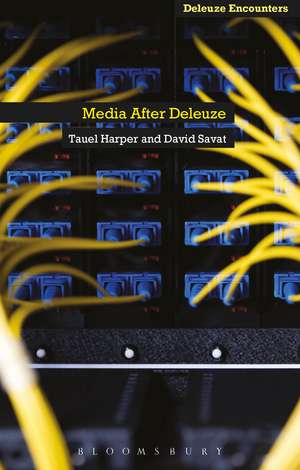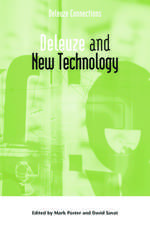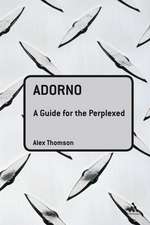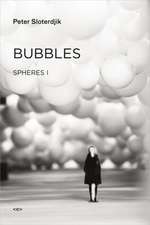Media After Deleuze: Deleuze and Guattari Encounters
Autor David Savat, Tauel Harperen Limba Engleză Paperback – 27 iul 2016
| Toate formatele și edițiile | Preț | Express |
|---|---|---|
| Paperback (1) | 177.32 lei 3-5 săpt. | |
| Bloomsbury Publishing – 27 iul 2016 | 177.32 lei 3-5 săpt. | |
| Hardback (1) | 569.22 lei 6-8 săpt. | |
| Bloomsbury Publishing – 27 iul 2016 | 569.22 lei 6-8 săpt. |
Preț: 177.32 lei
Preț vechi: 206.69 lei
-14% Nou
Puncte Express: 266
Preț estimativ în valută:
33.93€ • 35.53$ • 28.14£
33.93€ • 35.53$ • 28.14£
Carte disponibilă
Livrare economică 20 martie-03 aprilie
Preluare comenzi: 021 569.72.76
Specificații
ISBN-13: 9781472524904
ISBN-10: 147252490X
Pagini: 200
Dimensiuni: 138 x 216 x 16 mm
Greutate: 0.27 kg
Editura: Bloomsbury Publishing
Colecția Bloomsbury Academic
Seria Deleuze and Guattari Encounters
Locul publicării:London, United Kingdom
ISBN-10: 147252490X
Pagini: 200
Dimensiuni: 138 x 216 x 16 mm
Greutate: 0.27 kg
Editura: Bloomsbury Publishing
Colecția Bloomsbury Academic
Seria Deleuze and Guattari Encounters
Locul publicării:London, United Kingdom
Caracteristici
Of interest and relevance to students, researchers and practitioners rights across the arts and humanities
Notă biografică
David Savat is Lecturer in Communication and Media Studies at the University of Western Australia, Australia.Tauel Harper is Lecturer in Communication and Media Studies at the University of Western Australia, Australia.
Cuprins
1. Introduction: Media Machines and the Body Without Organs of CommunicationPart I: Assemblages2. Writing Machinesa. Regmines of Signsb. Printing Pressc. Processor3. Image Machinesa. Facialityb. Photographyc. Celebrity4. Distribution Machinesa. Connections and Flowb. Television and the Arborealc. Internet and the Rhizomatic5. Game Machinesa. The Smooth and the Striatedb. Digital Gamesc. Alternate Reality GamesPart II: Abstract Machines6. Newsa. What is the Body Without Organs of News?b. News Framing and the Urstaatc. Nomads of the News7. Adverstisinga. Desiring Machinesb. Advertising as Capturec. Advertising as Flight8. Genresa. Culture and Becomingb. Pop Culturec. Participatory CultureConclusion: Media Machines and their Lines of FlightBibliographyIndex
Recenzii
Harper and Savat revitalize Deleuze for the age of new media. The book flags the political urgency of Deleuze and Guattari's ideas . Indeed, the book's greatest strength is how it, in an accessible manner, mobilizes Deleuze's (and Guattari's) core ideas and how these can connect with the concerns of media studies.
In this long awaited book, so necessary for the field of media studies, David Savat and Tauel Harper have written a remarkably accessible text that equally balances the philosophical concepts of both Deleuze and Guattari. Concepts such as Assemblage theory, image machines, refrain, and especially the production of desire that runs through the entire book are beautifully explained and put to use in this capitalist digital age of control regarding gaming, television, news and information media, the Internet, marketing, genre theory and audience studies. Drawing on schizoanalysis, the book ends on an affirmative note as to what one should do given the challenges we all face in a media saturated environment.
A very creative and pedagogically adaptable montage of Deleuze and Guattari's key concepts through the lens of traditional media studies; more than a glossary, this work both updates and re-frames the production of contemporary media culture, making their work relevant again for media scholars.
In this long awaited book, so necessary for the field of media studies, David Savat and Tauel Harper have written a remarkably accessible text that equally balances the philosophical concepts of both Deleuze and Guattari. Concepts such as Assemblage theory, image machines, refrain, and especially the production of desire that runs through the entire book are beautifully explained and put to use in this capitalist digital age of control regarding gaming, television, news and information media, the Internet, marketing, genre theory and audience studies. Drawing on schizoanalysis, the book ends on an affirmative note as to what one should do given the challenges we all face in a media saturated environment.
A very creative and pedagogically adaptable montage of Deleuze and Guattari's key concepts through the lens of traditional media studies; more than a glossary, this work both updates and re-frames the production of contemporary media culture, making their work relevant again for media scholars.






























